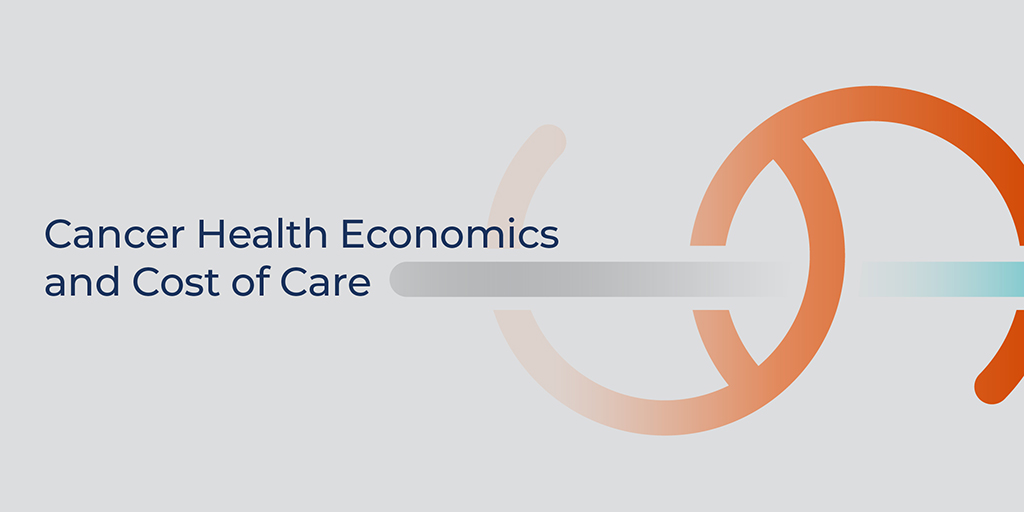Cancer Health Economics and Cost of Care
What is cancer health economics research?
Cancer health economic research is the application of health economics theory and models to cancer prevention and screening, diagnosis, treatment, survivorship, and end-of-life care. Cancer health economics research studies factors associated with the organization, production, delivery and demand for cancer-related care, as well as outcomes such as type, quantity, quality, and cost of care faced by the patient, family, payer, and society.
The scope also includes the development of data, measures and analytic methods specifically geared to support this research. As with health economics research more generally, cancer health economics research is ideally multidisciplinary, in this case combining clinical understanding of cancer control and the cancer care trajectory, with content and methodologic expertise related to economic inputs, outcomes, and approaches to measure and analyze them. The results of cancer health economics research may be used to inform individual decisions, delivery system or payment design and public policy.
Why conduct cancer health economics research?
- The cost of cancer care has risen substantially over the last 20 years.
- Cancer-related care employs a varied and complex array of providers and multimodal screening, diagnostic technologies, cancer treatments and supportive care therapies.
- Faced with complex alternatives and limited evidence regarding effectiveness, financial incentives may become predominant factors in choice of provider, care setting and treatment.
- The rising cost of cancer care coincides with expansions of publicly subsidized insurance, leading to a greater proportion of cancer care paid for by public funds.
- Due to changes in private health insurance benefits, commercial insurers may increase shifting of healthcare costs to patients through higher co-pays and deductibles.
- A growing number of cancer patients have difficulty paying their medical bills and experience a range of economic consequences, collectively referred to as financial hardship. The growing financial burden associated with cancer care may further exacerbate existing health care disparities.
Key areas of interest include, but are not limited to:
Cost of cancer-related medical care
- Economic factors affecting the delivery of cancer prevention and screening services.
- Healthcare utilization and cost trajectories, both during and beyond initial therapy.
- Variation in healthcare utilization and cost by patient sociodemographic, health status, social need, cancer type and other characteristics.
- Impact of patient insurance status, type of insurance, specific coverage policies and financial incentives, on utilization and cost of cancer-related care.
- Time and travel costs for patients and caregivers and the impact of these costs on healthcare utilization and other patient outcomes.
- Cost and cost-effectiveness of cancer prevention, treatment, and survivorship care interventions.
Cancer-related financial hardship
- Impact of financial hardship on patient outcomes and health care access and utilization.
- Variation in out-of-pocket costs and their influence on patient’s utilization of cancer screening, treatment or survivorship care.
- Delivery of financial navigation services and the impact on patient outcomes.
- Cost communication during treatment and survivorship care.
- Coping strategies that patients use to manage the high out-of-pocket costs for medical care and how these strategies affect clinical outcomes.
- Patient, provider, healthcare system, and community-level interventions that mitigate the impact of financial hardship on patient outcomes and enhance health equity.
Employment outcomes among cancer survivors
- How patients’ sociodemographic characteristics, behaviors, cancer type, treatment, and toxicities affect cancer-related work outcomes.
- Modifiable risk factors for employment disruption after cancer.
- Identification and integration of interventions to mitigate the impact of cancer and its treatment on employment outcomes.
Organizational and provider characteristics
- How financial incentives, regulations, and market structure influence cancer care providers and organizational structure of the healthcare system.
- Effects of financial incentives and other policies directed at providers that may influence quality, quantity, and cost of cancer-related care.
- Economic factors influencing the de-implementation of low-value care.
Collaborations with other entities
To support research in these areas, the NCI develops and makes available various data resources, and offers research funding, and engages in collaborations with other federal agencies, outside non-profit foundations, and other stakeholder groups.
Highlighted Notice of Funding Opportunities (NOFOs)
Events
Data Tools & Resources
Health Information National Trends Survey (HINTS)
The Health Information National Trends Survey (HINTS) regularly collects nationally representative data about the American public’s knowledge of, attitudes toward, and use of cancer- and health-related information.
Explore the data
National Health Interview Survey (NHIS) and Cancer Control Supplement (CCS)
The NHIS is a continuous, nationwide in-person survey of the civilian non-institutionalized population.
Learn more and view the CCS administrative scheduleMedical Expenditure Panel Survey (MEPS)
The Medical Expenditure Panel Survey (MEPS) is a nationally representative survey of the civilian noninstitutionalized population of all ages in the US. Conducted by the Agency for Healthcare Research and Quality (AHRQ), the MEPS collects comprehensive data on health care utilization and expenditures.
Learn more and read the publicationsSurveillance, Epidemiology, and End Results (SEER) Program
The Surveillance, Epidemiology, and End Results (SEER) Program provides information on cancer statistics in an effort to reduce the cancer burden among the U.S. population.
Program provides information on cancer statistics in an effort to reduce the cancer burden among the U.S. population.

Patterns of Care (POC) Studies
The Patterns of Care (POC) Studies are Congressionally-mandated initiatives to evaluate dissemination of state-of-the-art cancer therapy and diagnostics into community oncology practice and identify patient-, provider-, and system-level factors that are associated with receipt and utilization of cancer care. POC data can be accessed in collaboration with SEER registry principal investigators or the NCI scientific lead for POC.
or the NCI scientific lead for POC.
POC*Explorer
POC*Explorer is an interactive website allowing access to aggregate data from certain POC studies.
View and interact with the dataSEER-Medicare Linked Data Resource
SEER-Medicare data reflect the linkage of two large population-based resources of data, the NCI’s Surveillance Epidemiology and End Results (SEER) cancer registry data and the Centers for Medicare & Medicaid Services’ (CMS) Medicare enrollment, claims and clinical assessment data. This linked data provide detailed information about the healthcare delivered to Medicare beneficiaries with cancer and their health outcomes.
cancer registry data and the Centers for Medicare & Medicaid Services’ (CMS) Medicare enrollment, claims and clinical assessment data. This linked data provide detailed information about the healthcare delivered to Medicare beneficiaries with cancer and their health outcomes.
SEER-Medicaid Linked Data Resource
The SEER-Medicaid data reflect the linkage of the NCI’s Surveillance Epidemiology and End Results (SEER) cancer registry data and the Centers for Medicare & Medicaid Services’ (CMS) Medicaid enrollment data. This linked data provide detailed information about how Medicaid enrollment relates to cancer presentation, treatment, and outcomes.
cancer registry data and the Centers for Medicare & Medicaid Services’ (CMS) Medicaid enrollment data. This linked data provide detailed information about how Medicaid enrollment relates to cancer presentation, treatment, and outcomes.
SEER-MHOS Linked Data Resource
The SEER-MHOS data set is a resource to research health outcomes in cancer. It is based on a linkage between the NCI's Surveillance, Epidemiology and End Results (SEER) cancer registry and the Centers for Medicare & Medicaid Services' (CMS) Medicare Health Outcomes Survey (MHOS)
cancer registry and the Centers for Medicare & Medicaid Services' (CMS) Medicare Health Outcomes Survey (MHOS) that provides information about the health-related quality of life (HRQOL) of Medicare Advantage Organization enrollees.
that provides information about the health-related quality of life (HRQOL) of Medicare Advantage Organization enrollees.
SEER-CAHPS Linked Data Resource
The SEER-CAHPS data resource is a resource for quality of cancer care research based on a linkage between the NCI's Surveillance, Epidemiology and End Results (SEER) cancer registry data and the Centers for Medicare & Medicaid Services' (CMS) Medicare Consumer Assessment of Healthcare Providers and Systems (CAHPS®) patient surveys.
cancer registry data and the Centers for Medicare & Medicaid Services' (CMS) Medicare Consumer Assessment of Healthcare Providers and Systems (CAHPS®) patient surveys.
Contact Information
For more information on Cancer Health Economics research, contact:


